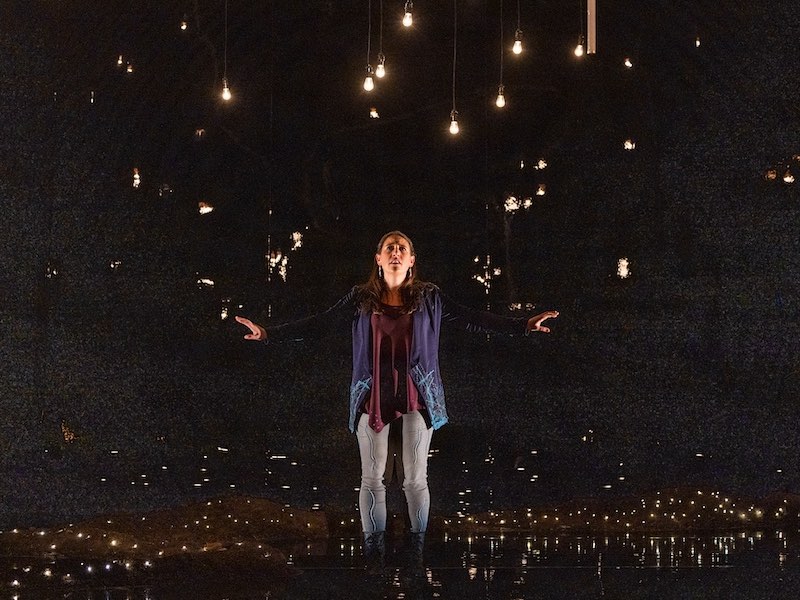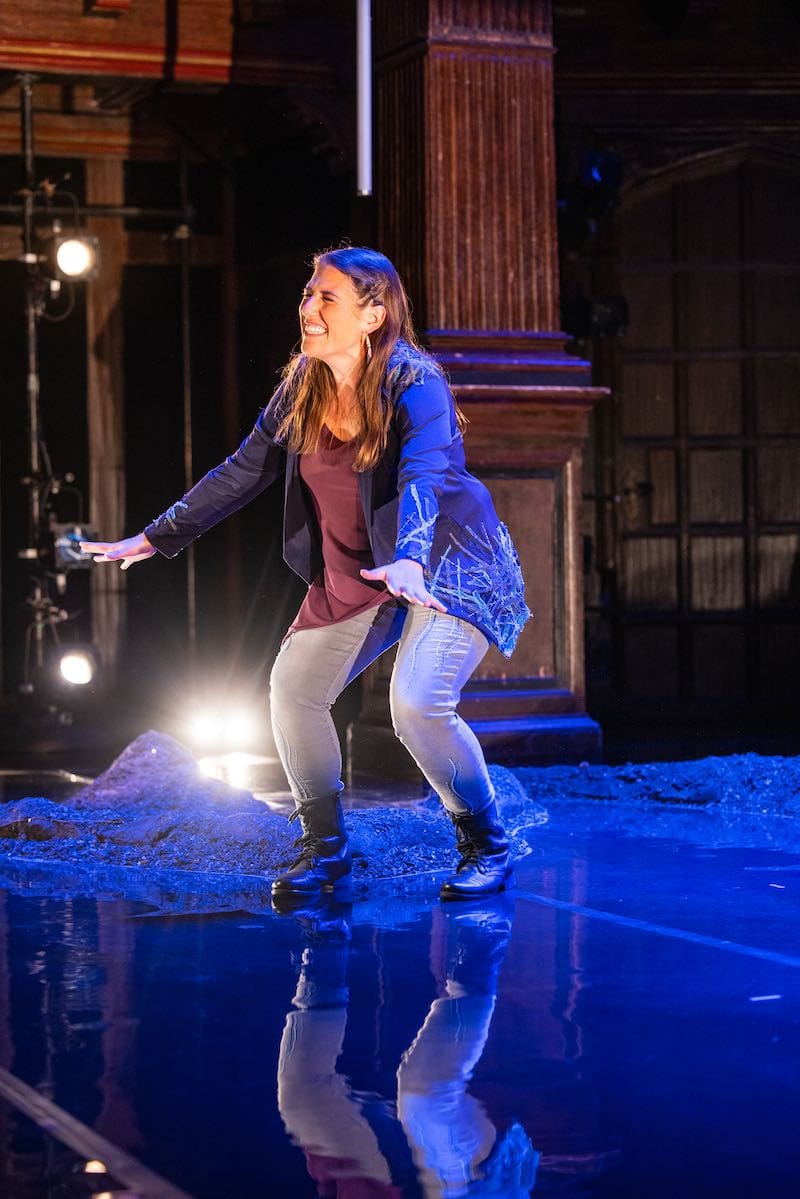I will admit I’m hesitant to call Where We Belong “innovative,” not because there is nothing unique or original about it but because of a story Madeline Sayet tells at one point in her one-woman play.
She explains how early in her career, someone called her decolonized interpretation of Shakespeare’s works “innovative,” a description that confused her. As an Indigenous woman, decolonizing Shakespeare isn’t a new idea—for her, it is a natural conclusion.
It is a telling moment, and one that informs much of the thematic basis of Where We Belong, now playing through March 10 at Folger Theatre, in association with Woolly Mammoth Theatre Company, following a 2021 film adaptation and national tour.

Where We Belong, a powerful play that weaves together Sayet’s and other Mohegans’ stories, grapples with a lot of issues and asks a lot of questions, many of which, at least today, are not new. But Sayet’s identity provides unique and innovative—yes, innovative, at least to me—ways of grappling with the questions of identity that are defining contemporary America.
The central story, one of many, of Where We Belong is Sayet’s experience as an Indigenous person, specifically a Mohegan woman, working on a PhD on Shakespeare in England, an experience that was often isolating. She finds in England a culture completely in denial of its role in colonialism, where even academics seem to only want her perspective on Shakespeare if it doesn’t offend them.
This play, to be clear, is not about Shakespeare—Sayet says so explicitly early on—but Shakespeare does come up a lot, largely because she fell in love with his works as a child, to some extent as an escape from having to grapple with her identity as an Indigenous woman in a country hostile to that identity.
In fact, Sayet’s Mohegan identity is much of the real focus of Where We Belong. She talks about her own experiences while also weaving in stories from the tribe’s history, including that of Mahomet Weyonomon, a sachem of the Mohegan tribe, who traveled to England in 1735 to petition the crown after treaty betrayals.
Although Sayet’s personal narrative is told mostly in chronological order, Where We Belong jumps constantly between personal memories, tribal history, Shakespeare, and broader conceptual questions. The narrative might seem jumbled in another artist’s hands, but as written by Sayet, the whole play flows smoothly from point to point, none of which are wasted.
The staging, as well, forms a kind of connective tissue for Sayet’s work. Director Mei Ann Teo uses the space, alongside Sayet’s movements in it, purposefully, connecting the physical space to memories and ideas in a way that is extremely effective at communicating the story’s weaving narratives.
Meanwhile, Production Designer Hao Bai has crafted a visually stunning environment for Sayet’s performance, utilizing minimalist onstage lighting against a reflective background that is as interesting as it is thematically important. Hao’s lighting design, too, complements the emotions of the performance without becoming the performance.

The themes of Where We Belong—those issues and questions Sayet is grappling with—also work to form throughlines, as Sayet returns to ideas again and again as her views transform over time. Most are related to identity: erasure of identity, reclamation of identity, the borders between identities—both physical and not.
Language, in particular, forms a backbone to the play. After all, language is one of the most important aspects of a culture. And yet, the Mohegan language has been largely erased, and while the tribe is working to revive it, the last fluent speaker—Fidelia Fielding, one of Sayet’s ancestors—died more than a century ago. Sayet compares this to Shakespeare, one man whose words have lived on for hundreds of years.
Shakespeare does indeed come up a lot in Where We Belong, not because the play is about him but because he serves as a conduit for many other issues in the play. Early in her career, she viewed his work as anticolonialist, but later grapples with whether doing so serves as a form of reclamation or a form of assimilation, because white people so desperately want Shakespeare, a man very much of his time and context, to be universal.
Perhaps the harshest realization for Sayet is that, in order for her to tell Indigenous stories, she must wrap them in Shakespeare in order to do so. It is a harsh realization for the audience, too. Where We Belong, after all, was co-produced by and is being performed at Folger Theatre, part of the Folger Shakespeare Library.
Of course, we will never know if Sayet’s work would have been produced at this level without its Shakespearean connection, but at least in this form and in this space, Where We Belong—a compelling and important work of theater, to be sure—is less a victory lap for platforming Indigenous voices and more a reminder of the work still to be done.
Running Time: 90 minutes, with no intermission.
Where We Belong plays through March 10, 2024, at the Folger Shakespeare Theatre, 201 E Capitol Street SE, Washington, DC, in association with Woolly Mammoth Theatre Company. Purchase tickets ($20–$84; discount programs available) online or from the Box Office at (202) 544-7077 or [email protected].
Credits for the cast and creative team are online here.
COVID Safety: Masking is optional. Masks will be provided upon request. Folger Theatre has denoted several performances during the 2023/24 season as mask-required by all audience members, staff, and volunteers. The mask-required performances for Where We Belong are on Saturday, March 9, 2024, at 2 pm and 8 pm. Folger’s complete COVID safety protocols are here.
Where We Belong
By Madeline Sayet
Directed by Mei Ann Teo
SEE ALSO:
Her Mohegan name means blackbird and she soars in ‘Where We Belong’ (review of the video version by Bob Ashby originally published June 14, 2021)




